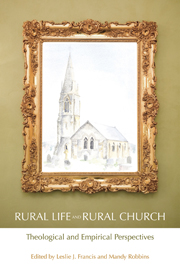Book contents
- Frontmatter
- Contents
- Preface
- Foreword by The Bishop of Shrewsbury, The Rt Revd Mark Rylands
- 1 Introduction: shaping rural theology
- PART 1 PERSPECTIVES FROM THE BIBLE
- PART 2 PERSPECTIVES FROM ORDINARY THEOLOGY
- PART 3 THEOLOGICAL AND SOCIOLOGICAL PERSPECTIVES
- PART 4 HISTORICAL PERSPECTIVES
- PART 5 LISTENING TO VISITORS
- 15 I was glad: listening to visitors to country churches
- 16 Sacred place and pilgrimage: modern visitors to the shrine of St Melangell
- 17 Visitor experiences of St Davids Cathedral: the two worlds of pilgrims and secular tourists
- PART 6 LISTENING TO THE COMMUNITY
- PART 7 LISTENING TO CHURCHGOERS
- PART 8 LISTENING TO CHURCH LEADERS
- PART 9 SATISFACTION AND STRESS IN MINISTRY
- Contributors
- Sources
- Subject Index
- Name Index
17 - Visitor experiences of St Davids Cathedral: the two worlds of pilgrims and secular tourists
from PART 5 - LISTENING TO VISITORS
- Frontmatter
- Contents
- Preface
- Foreword by The Bishop of Shrewsbury, The Rt Revd Mark Rylands
- 1 Introduction: shaping rural theology
- PART 1 PERSPECTIVES FROM THE BIBLE
- PART 2 PERSPECTIVES FROM ORDINARY THEOLOGY
- PART 3 THEOLOGICAL AND SOCIOLOGICAL PERSPECTIVES
- PART 4 HISTORICAL PERSPECTIVES
- PART 5 LISTENING TO VISITORS
- 15 I was glad: listening to visitors to country churches
- 16 Sacred place and pilgrimage: modern visitors to the shrine of St Melangell
- 17 Visitor experiences of St Davids Cathedral: the two worlds of pilgrims and secular tourists
- PART 6 LISTENING TO THE COMMUNITY
- PART 7 LISTENING TO CHURCHGOERS
- PART 8 LISTENING TO CHURCH LEADERS
- PART 9 SATISFACTION AND STRESS IN MINISTRY
- Contributors
- Sources
- Subject Index
- Name Index
Summary
Abstract – The remote and rural St Davids Cathedral in West Wales receives a steady flow of visitors throughout the year. In order to develop its ministry in this field, a sample of 514 visitors completed a detailed questionnaire designed to explore their experiences of the cathedral, together with a measure of their personal church attendance. The data demonstrated clear differences between the experiences of pilgrims (defined as visitors who attend church services weekly) and the experiences of secular tourists (defined as visitors who never attend church services). The implications of these findings are discussed for cathedral ministry more generally.
Some argue that cathedrals have been sources of tourism since their establishment (Lewis, 1996). Both the importance of tourism for cathedrals, and the importance of cathedrals for tourism, have been highlighted by Heritage and Renewal, the report of the Archbishops' Commission on Cathedrals (1994, p. 135):
Tourism is of great significance to cathedrals – in terms of their mission of teaching, evangelism and welcome, and as an important source of income. Cathedrals also play a major part in the nation's tourism.
Comparatively little is known, however, about who visits cathedrals, why they visit, and what they make of the visitor experience. Answers to such questions are particularly pertinent to illuminating why places of religious interest, especially cathedrals, are so central to tourism in what some commentators currently regard as the post-Christian context of contemporary Britain (Brown, 2001).
One of the first to explore such questions about cathedral visitors with some scientific rigour was English Cathedrals and Tourism, a report produced for the English Tourist Board (1979). A questionnaire was sent to 45 cathedrals and greater churches in England, of which 39 were subsequently visited.
- Type
- Chapter
- Information
- Rural Life and Rural ChurchTheological and Empirical Perspectives, pp. 201 - 214Publisher: Acumen PublishingPrint publication year: 2012



